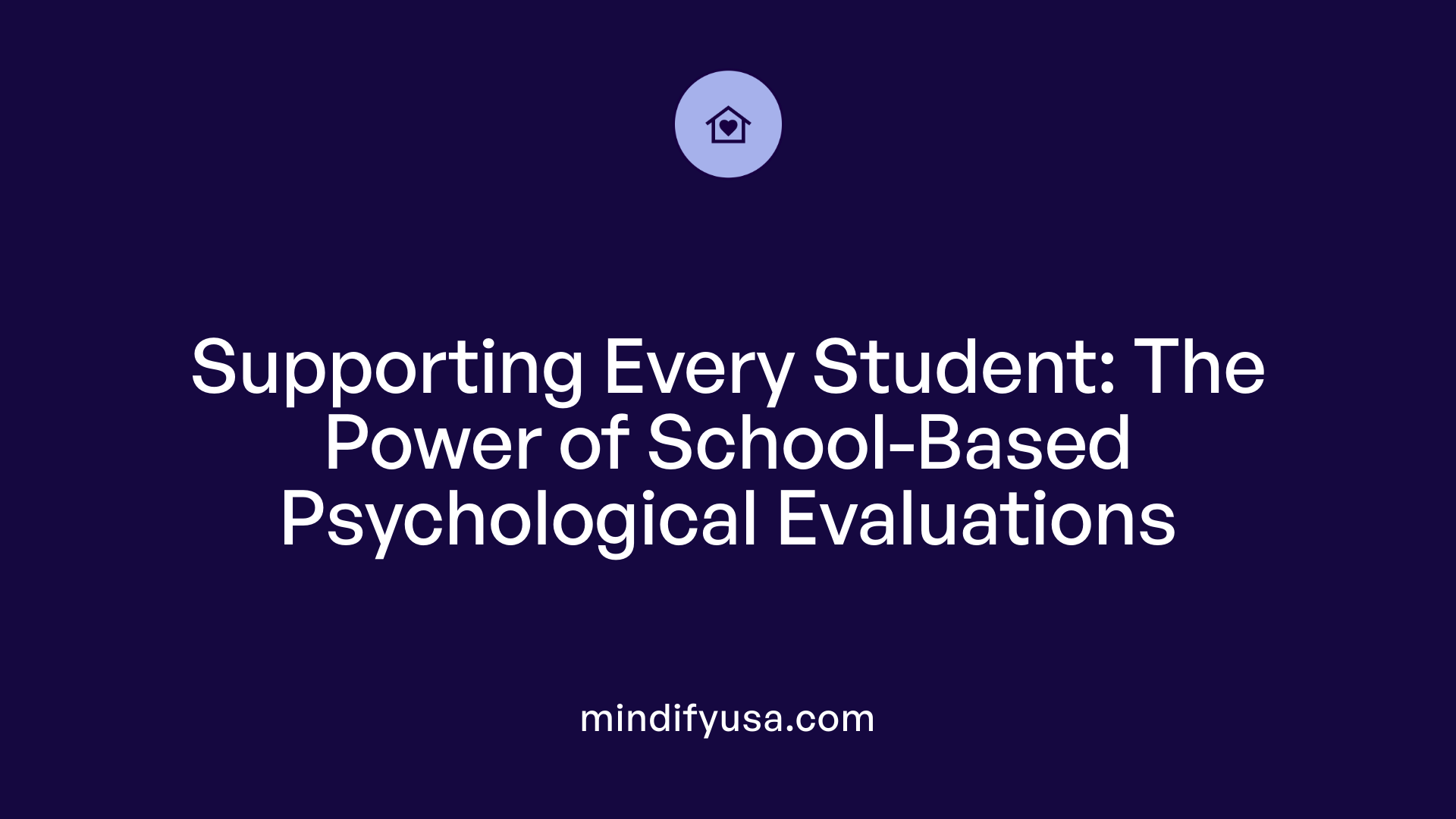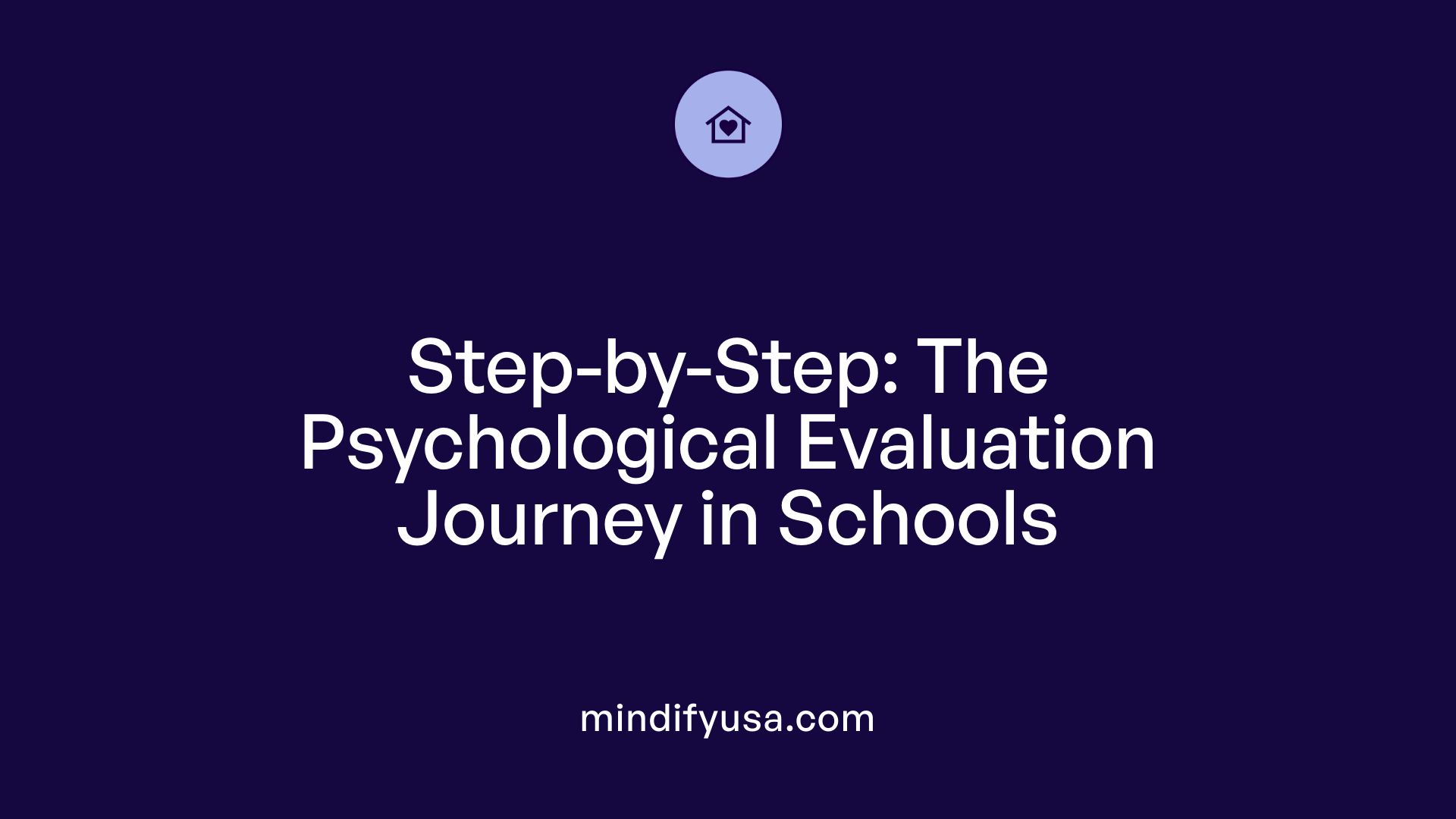A Critical Tool for Schools and Families
Psychological evaluations are vital in understanding and addressing behavioral issues in children within educational settings. These assessments offer valuable insights into a child's emotional, social, and learning profiles, guiding tailored interventions and support strategies that promote positive development and academic success.
The Role and Benefits of Psychological Assessments in Schools

What role do psychological assessments play in understanding and addressing behavioral, emotional, and learning difficulties?
Psychological assessments are vital tools for gaining a comprehensive understanding of a child's mental health, social skills, and learning needs. These evaluations are conducted using standardized tests and observation methods by qualified professionals such as school psychologists and psychiatrists. They provide detailed information about a child's cognitive abilities, emotional state, behavior patterns, and social interactions.
For example, assessments can identify learning disabilities like dyslexia or ADHD, which might not be obvious through regular classroom observation. They also help in recognizing emotional issues such as anxiety, depression, or social deficits. When these challenges are pinpointed early, educators and parents can implement targeted strategies and support.
One primary benefit is the ability to develop individualized support plans, including 504 accommodations or Individualized Education Programs (IEPs). These plans might include behavioral interventions, academic modifications, or therapeutic services tailored to the child's specific profile.
Collaborating with parents, teachers, school counselors, and mental health professionals is crucial. The evaluation results serve as a foundation for creating an inclusive and supportive learning environment. This teamwork enhances the child's ability to succeed academically and emotionally.
In summary, psychological assessments not only diagnose challenges but also pave the way for effective interventions and continuous support, fostering the child's overall development and well-being.
Types of Evaluations and Methods Used for Children with Behavioral Issues

What are the common types and methods of psychological evaluations used for children with behavioral issues?
Children displaying behavioral concerns often undergo various assessments to understand their emotional, social, and cognitive functioning. A psychological evaluation by school psychologists is a primary step in this process. These professionals use standardized tests such as IQ assessments—like the WISC-V—to measure intellectual abilities.
Behavioral evaluations are also common, utilizing behavior rating scales such as the Conners-4 or the Child Behavior Checklist (CBCL). These tools gather input from parents, teachers, and caregivers about the child's typical behaviors across different settings.
Social-emotional assessments help identify issues like anxiety, depression, or social skills deficits. These might involve questionnaires or structured interviews with the child and family.
In some cases, neuropsychological testing provides a detailed profile of how a child's brain functions concerning attention, memory, and executive functions. This is particularly useful when understanding complex learning or behavioral challenges.
Assessment methods involve a combination of approaches:
- Clinical interviews with the child and their family
- Questionnaires completed by parents, teachers, and sometimes the child
- Direct observation of the child's behavior in natural settings
- Formal testing using validated instruments suitable for the child's age and symptoms
These assessments help distinguish among various conditions such as ADHD, autism spectrum disorder, learning disabilities, or emotional disturbances. The comprehensive results support diagnosis and enable tailored interventions, including educational plans like IEPs or behavioral therapy options.
By understanding a child's unique profile through these evaluations, educators and clinicians can implement effective strategies to improve behavioral and emotional well-being, paving the way for better academic and social success.
The Evaluation Process and What It Entails

What is the process involved in conducting a psychological evaluation for a student?
The evaluation process for a child begins when a referral is made. This can come from parents, teachers, or the school team, to explore whether the child has specific needs requiring support. Once a referral is made, a team of professionals—including school psychologists, teachers, parents, and sometimes other specialists—collaborates to determine the most suitable type of assessment.
Several types of evaluations may be conducted based on the child's unique needs. These include psychological evaluations, psychoeducational assessments, neuropsychological evaluations, speech and language evaluations, and occupational therapy evaluations. Each type provides insight into different areas such as behavior, cognitive abilities, academic skills, sensory processing, or emotional health.
The core of the evaluation involves gathering detailed information through interviews, observations, and standardized assessments. These assessments are administered during formal testing sessions and may include tools like achievement tests, behavior rating scales, or cognitive tests, depending on what is being evaluated.
Following testing, examiners compile a comprehensive report that discusses the child's strengths and areas of difficulty. This report typically includes findings related to cognitive, academic, social, and emotional functioning, along with recommendations. These recommendations help determine eligibility for services such as Individualized Education Programs (IEPs), 504 plans, or other support strategies.
Throughout the process, parents are actively involved, given opportunities to provide input and ask questions. While school evaluations are free, parents also have the option for private assessments if they feel these are necessary or more thorough. Ultimately, this evaluative process guides decision-making about educational support and intervention to best meet the child's needs.
How do assessments influence support plans?
The detailed results from these evaluations directly impact the development of tailored support strategies. If a child qualifies, they may receive specialized instruction, behavioral modifications, or accommodations to assist their learning and emotional health. Regular follow-up ensures that supports are adjusted as needed, fostering a positive educational environment for every student.
| Assessment Type | Main Focus | Typical Professionals Conducting It | Common Tools Used | Purpose of Evaluation |
|---|---|---|---|---|
| Psychological | Behavior, emotions, social skills | School Psychologists | Standardized tests, questionnaires | Diagnose mental health issues, emotional assessments |
| Psychoeducational | Cognitive abilities, academic skills | School Psychologists | WISC, Woodcock-Johnson, KTEA-II | Identify learning disabilities, cognitive strengths |
| Neuropsychological | Learning, emotional, neurological profile | Neuropsychologists | Advanced cognitive tests, interviews | Provide detailed profile of learning and emotional functioning |
| Speech/Language | Language understanding and expression | Speech-language pathologists | Language assessments, observations | Improve communication skills |
| Occupational Therapy | Motor skills, sensory processing | Occupational therapists | Motor skill assessments | Support physical development and sensory needs |
Understanding these processes ensures students receive appropriate support, helping them succeed academically and socially.
Interpreting Results and Developing Support Strategies
How can educators and parents interpret the results of a psychological evaluation?
To make sense of a child's psychological evaluation, parents and teachers should first carefully review the evaluation report. This document highlights the child's strengths, challenges, and overall functioning in cognitive, academic, and emotional areas.
Understanding key terms such as IQ scores, percentile ranks, and standard scores helps clarify what the data reveals about the child's abilities. For example, a percentile rank shows how a child's performance compares to peers.
Collaboration among team members is vital. Parents, teachers, psychologists, and other support staff should discuss the findings to see how they relate to the child's school performance and behavior.
Interpreting these results allows for the creation of personalized education plans, including accommodations or targeted interventions. It helps in understanding whether a child has specific learning disabilities, emotional issues, or behavioral concerns.
Asking questions, requesting clarification from professionals, and considering if additional assessments are needed can deepen understanding. This comprehensive approach enables the development of effective support strategies tailored to the child's unique needs.
How can schools use evaluation outcomes to support children?
Using evaluation results, educators can develop individualized education programs (IEPs) or Section 504 plans that provide the right support. These plans may include specialized teaching methods, behavioral interventions, or accommodations like extended test time.
Connecting findings to available services ensures children receive appropriate tutoring, therapy, or behavioral support. Regular follow-up assessments help monitor progress and adjust strategies as needed.
Such ongoing support fosters a more inclusive learning environment where children can thrive academically and socially.
| Step in Support Planning | Actions | Details |
|---|---|---|
| Interpreting results | Review report, clarify terms | Engage all stakeholders in understanding child's profile |
| Developing plans | Create IEPs or 504 plans | Tailor support based on evaluation data |
| Connecting services | Link to therapies and interventions | Implement accommodations and supports |
| Follow-up assessments | Monitor and revise | Track progress and adjust strategies |
Additional Resources
For further guidance, searching "interpretation of psychological evaluation results in schools" provides many helpful resources and professional insights, aiding stakeholders in making informed decisions.
Supporting Children through Informed Evaluation and Action
Psychological evaluations serve as a cornerstone in understanding and supporting children with behavioral, emotional, and learning challenges. By providing a detailed picture of a child's cognitive, emotional, and social functioning, assessments empower educators and parents to develop tailored intervention strategies, educational plans, and support systems. Whether through school-based or private evaluations, the goal remains to ensure each child receives the appropriate resources and encouragement to thrive both academically and emotionally. Collaboration, clear interpretation, and ongoing support are key components in translating assessment results into meaningful positive outcomes for children.
References
- Evaluations for Support at School
- Understanding Psycho-Educational Evaluations
- How to Know If Your Child Needs a Psychological Evaluation
- Psychological Assessment of Children
- Psychoeducational Evaluations for Children
- Psychological Testing and IEPs: What Parents Need to Know
- Best Practices for School Psychological Evaluations





































































































